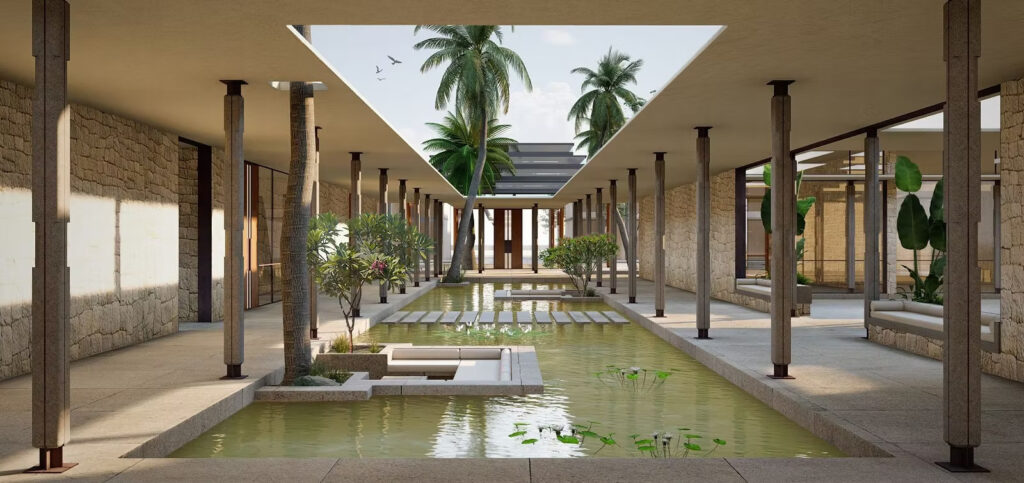
The hospitality industry is one of the most dynamic and competitive sectors in India today. With travelers expecting unique experiences and premium comfort, the design and architecture of a resort have become as important as its services and amenities. Selecting the best architect for resort in India is not just about creating a visually appealing structure—it’s about shaping experiences, reflecting culture, and ensuring operational efficiency that supports long-term success.
The Growing Importance of Architectural Design in Resorts

In recent years, resorts have shifted from being simple accommodations to destinations in themselves. Tourists and business travelers alike expect an environment that blends luxury with authenticity. Architecture plays a pivotal role in creating such spaces, where the setting tells a story, connects guests with the surrounding environment, and provides unmatched comfort. This is why the choice of the best architect for resort in India is critical for developers aiming to stand out in a crowded market.
Creating Experiences Beyond Accommodation
Guests today don’t just book a resort for a stay; they look for experiences that linger long after the trip. A well-designed resort integrates natural surroundings, cultural aesthetics, and modern amenities seamlessly. For instance, incorporating local materials, traditional architectural influences, and sustainability practices can elevate a resort’s design. This is where the role of a luxury hotel architect becomes crucial. Their expertise ensures that every detail—from spatial planning to interior design—adds value to the guest’s overall experience.
Blending Culture and Modernity
India is a land of diverse traditions, heritage, and natural beauty. A resort that embodies this richness immediately connects with its guests. The best architect for resort in India understands how to weave cultural elements into modern luxury design. Whether it’s through courtyards inspired by traditional havelis, eco-friendly bamboo cottages by the coast, or contemporary villas with local artistic influences, architecture creates an emotional bond between the property and its guests.
On the other hand, a luxury hotel architect ensures these cultural elements don’t compromise modern expectations. Guests want cutting-edge facilities—smart rooms, wellness centers, fine dining areas, and sustainable technologies—integrated seamlessly with cultural touches. Achieving this balance requires architectural expertise that goes beyond aesthetics.
Sustainable and Eco-Friendly Practices

The hospitality industry faces growing scrutiny for its environmental impact. Modern travelers are increasingly eco-conscious, preferring resorts that emphasize sustainability. The best architect for resort in India prioritizes eco-friendly practices such as rainwater harvesting, energy-efficient systems, the use of renewable materials, and designs that harmonize with nature.
Meanwhile, a luxury hotel architect ensures that sustainability aligns with comfort and elegance. Guests can enjoy the luxury of infinity pools, spa retreats, or stylish suites without compromising on eco-friendly initiatives. This dual focus makes resorts more attractive to both conscious travelers and high-end clientele.
Enhancing Operational Efficiency
A resort’s success doesn’t rely solely on its design appeal but also on its operational efficiency. From kitchen layouts to staff movement, maintenance systems, and guest circulation, architecture influences how smoothly a resort functions. The best architect for resort in India ensures that spaces are not only beautiful but also practical.
In the same way, a luxury hotel architect pays attention to the seamless integration of guest services with back-end operations. This ensures that while guests enjoy uninterrupted luxury, the staff can efficiently manage operations behind the scenes. Such planning minimizes operational costs while maximizing guest satisfaction.
Attracting and Retaining Guests

Hospitality success depends heavily on repeat customers and word-of-mouth marketing. A resort that delights guests through its design naturally becomes a preferred choice. Scenic views, open and airy layouts, unique architecture, and luxurious finishes all contribute to building a brand identity that leaves lasting impressions. By hiring the best architect for resort in India, developers can ensure that the property stands out in an industry where first impressions mean everything.
Additionally, the expertise of a luxury hotel architect ensures the resort caters to the premium market, offering a distinct combination of grandeur and exclusivity. This gives resorts a competitive edge in attracting high-value guests who expect nothing less than the finest.
Driving Return on Investment (ROI)
Investing in quality architecture pays off in the long run. A well-designed resort attracts more guests, commands higher room rates, and requires less frequent renovations. The best architect for resort in India focuses on creating timeless designs that maintain relevance even as trends evolve. Combined with the skills of a luxury hotel architect, this approach ensures financial sustainability, brand prestige, and continued growth in a competitive industry.
Conclusion
Choosing the best architect for resort in India is more than a design decision; it is a strategic investment in hospitality success. With the growing emphasis on cultural authenticity, sustainability, operational efficiency, and luxury, architecture has become the backbone of memorable guest experiences. Collaborating with a seasoned luxury hotel architect ensures that resorts not only meet but exceed the expectations of modern travelers.
For developers seeking to achieve this perfect balance, SJK Architects stands out as a trusted partner. With deep expertise in resort and hospitality design, they combine innovation, cultural insight, and sustainable practices to deliver exceptional architectural solutions that define success in India’s ever-evolving hospitality sector.





